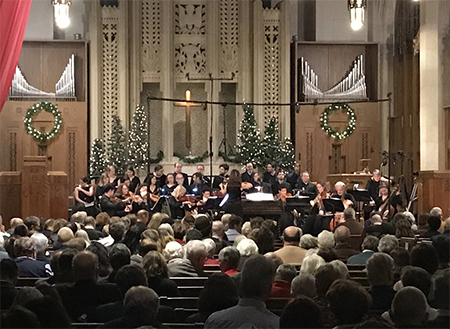by David Kulma

Written in 1741 and premiered a year later in Dublin, Messiah is quite a strange piece in its historical context. A sacred oratorio without characters or a self-standing plot, Handel set biblical verses collected and arranged by Charles Jennens to frame the life of Jesus with Old Testament prophecy and premonitions of end times from the Book of Revelations. The music is so infectious that it has continued to be performed continuously for 275 years.
Sorrell’s well-thought-out take on this familiar music was fleet-footed and emotionally responsive. The music moved at a light, quick pace, emphasizing large beats. With the wonderful instrumentalists and singers at Sorrell’s disposal, Messiah became a land of discovery rather than a nostalgic tour.
The four vocal soloists were magnificent. Soprano Amanda Powell was electrically charming in “Rejoice Greatly” and piously powerful in “I know that my Redeemer liveth” — with a joyous obbligato from violinist Johanna Novom. Countertenor Daniel Moody brought furious fireworks to “But who may abide,” and a mournful pathos to “He was despised.” “Thou art gone up on high” featured his beautiful high register and a delightful violin obbligato from Julie Andrijeski.
Tenor Ross Hauck set the revelatory tone in “Comfort ye” and “Every valley,” while his extended solo section in Part 2 from “All they that see him” to “But thou didst not leave” was immensely affecting in its sadness. Baritone David McFerrin was glorious in all three of his solos: precise shaking and raging during “Thus saith the Lord” and “Why do the nations,” and an amazingly comfortable and stentorian “The Trumpet shall sound” — with powerful playing from trumpeter Steven Marquardt.
But the main reason anyone takes in this music is to hear the chorus, and Apollo’s Singers — which included the 4 soloists in their complement of 23 — made this complex music sound easy and riven with emotion. Especially powerful was the opening of Part 2 — “Surely he hath borne our griefs,” “And with his stripes,” and “All we, like sheep” — which explores many hues. And the celebratory final chorus “Worthy is the Lamb” opened miraculously, ending in fugal glory.
Published on ClevelandClassical.com December 10, 2018.
Click here for a printable copy of this article



